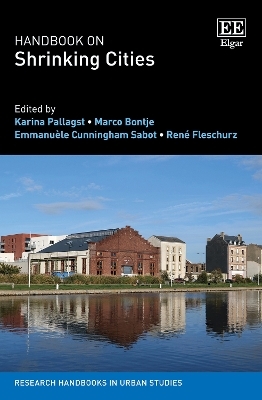
Handbook on Shrinking Cities
Edward Elgar Publishing Ltd (Verlag)
978-1-83910-703-0 (ISBN)
Offering a timely response to the endurance of decline in cities across the globe, contributions from top scholars showcase a wide range of perspectives on the ongoing challenges of shrinkage. Chapters cover topics of ‘governance’, ‘greening’ and ‘right-sizing’, and ‘regrowth’, laying the relevant groundwork for the Handbook’s proposals for dealing with shrinkage in the age of COVID-19 and beyond. Leading experts in the fields of urban and regional development contribute novel ideas pertinent to the future of shrinking cities, considering factors such as economic prosperity, liveability, social stability, and innovation, ultimately representing a paradigmatic shift from growth-centred planning to the notion of ‘shrinking sustainably’.
In suggesting strategies to reverse decline and generate newer, more robust development, this prescient Handbook will prove beneficial to scholars of human geography and urban planning. The wide range of case studies will also make this a vital read for planning practitioners.
Edited by Karina Pallagst, Professor for International Planning Systems, Faculty of Spatial and Environmental Planning, Technische Universität Kaiserslautern, Germany, Marco Bontje, Senior Lecturer, Department of Geography, Planning and International Development Studies, University of Amsterdam, the Netherlands, Emmanuèle Cunningham Sabot, Professor of Urban Studies, École Normale Supérieure (ENS), Paris, France and René Fleschurz, Project Manager, RE-CITY ITN project, Department of International Planning Systems, Faculty of Spatial and Environmental Planning, Technische Universität Kaiserslautern, Germany
Contents:
Foreword xiv
Introduction: shrinking cities research in times of COVID-19 1
Karina Pallagst and Patricia M.I. Hammer
PART I CONCEPTUALISING SHRINKING SMART
1 The language of shrinking cities: terminology and translation to
describe a new urban regime 9
Emmanuèle Cunningham Sabot and Maja Ročak
2 Shrinking cities: new insights into planning cultures 26
Karina Pallagst and René Fleschurz
3 Path dependence in shrinking cities: learning from the past 40
Victoria Pinoncely
4 Shrinking smart from theory to practice: an epistemological approach to
constructing a new planning concept 54
Bozhidar Ivanov
5 Place attachment and negative mindset in shrinking cities: is there
a contradiction? 67
Solène Le Borgne
6 Understanding the role of social capital in regenerating shrinking cities:
insights from the Netherlands 80
Maja Ročak
7 Shrinking cities as epistemic communities 94
Ivonne Audirac
8 Urban shrinkage and socio-economic segregation in medium-sized
cities: the case of Gera 108
David Huntington
PART II GOVERNING SHRINKING CITIES
9 Governance in shrinking cities: the role of active citizenship in
emerging governance 122
Agnes Matoga
10 Urban mindware in governing post-socialist shrinking cities 134
Krzysztof Stachowiak and Tadeusz Stryjakiewicz
11 Governance challenges in shrinking cities: the example of brownfield
site reuse and governance 148
Dieter Rink and Annegret Haase
12 Shrinking cities are here to stay: place-sensitive policy responses? 162
Flavio Besana and Kai Böhme
13 The legal and planning system for shrinking cities in Japan 178
Tetsuji Uemura
14 Towards brighter futures for European small and medium-sized towns:
what can social innovation contribute? 193
Marco Bontje, Nicola Bacon, David Bole and Claire Gordon
15 Shrinking cities and cross-border context: the example of the twin cities
of Forbach (Moselle, France) and Völklingen (Saarland, Germany) 208
Frédérique Morel-Doridat
PART III GREENING/RIGHTSIZING SHRINKING CITIES
16 Adaptation of infrastructures in shrinking cities: a review 222
Fanny Augis
17 A growing field in shrinking cities: a literature review on shrinkage and
urban green space 236
Olivia Lewis
18 Utilising solar energy and technology production-oriented strategies in
shrinking cities 250
Simone Di Pietro
19 Urban green innovation and revitalisation of declining areas and vacant
spaces in shrinking cities 264
José G. Vargas-Hernández and Patricia M.I. Hammer
20 Reflections on the challenges for public value capture in shrinking cities 278
Sílvia Sousa and Paulo Pinho
21 Carbon mitigation for shrinking cities 292
Helen Mulligan
22 Regrowth challenges of English cities in the context of flood risk:
a discussion on flood resilience and regrowth in Hull, United Kingdom 308
Faeeza Mackay, Stephen Platt and Fulvio Domenico Lopane
23 Cultural branding and adaptive reuse in shrinking cities: a comparative
study of Turin, Italy and Lowell, USA 324
Justin B. Hollander and Marissa G. Meaney
PART IV REGROWING SHRINKING CITIES
24 Variations of urban regrowth – systematising driving factors and
contextual conditions: the European perspective 338
Annegret Haase, Marco Bontje, Dieter Rink, Chris Couch, Szymon
Marcińczak, Petr Rumpel and Manuel Wolff
25 Issues, diffusion and solutions of shrinkage in French heritage towns’ centres 353
Alix de La Gaignonnière
26 Pop Up City and interim uses 367
Terry Schwarz
27 Smart cities as a substitute industry revitalisation approach to shrinking
cities in Germany? 381
Jakob Schackmar
28 Refugees in shrinking cities: the role of place and belonging in
refugee-led revitalisation 395
Norma Schemschat
29 Old industrial cities striving to attract and retain knowledge workers:
a case study from Spain 409
Simón Sánchez-Moral, Alfonso Arellano and David Moreno
30 Data, policy and segregation, open source data and catalysing inclusive
culture-led economic development: contextualising smart city 422
Jasmin Aber
Index
| Erscheinungsdatum | 19.10.2022 |
|---|---|
| Reihe/Serie | Research Handbooks in Urban Studies series |
| Verlagsort | Cheltenham |
| Sprache | englisch |
| Maße | 169 x 244 mm |
| Themenwelt | Naturwissenschaften ► Geowissenschaften ► Geografie / Kartografie |
| Sozialwissenschaften ► Soziologie | |
| ISBN-10 | 1-83910-703-0 / 1839107030 |
| ISBN-13 | 978-1-83910-703-0 / 9781839107030 |
| Zustand | Neuware |
| Haben Sie eine Frage zum Produkt? |
aus dem Bereich


